Genocide and the fight for humanity
The upcoming commemoration of the 75th anniversary of the United Nations Convention on Genocide should force the world to ask: “Why again?”
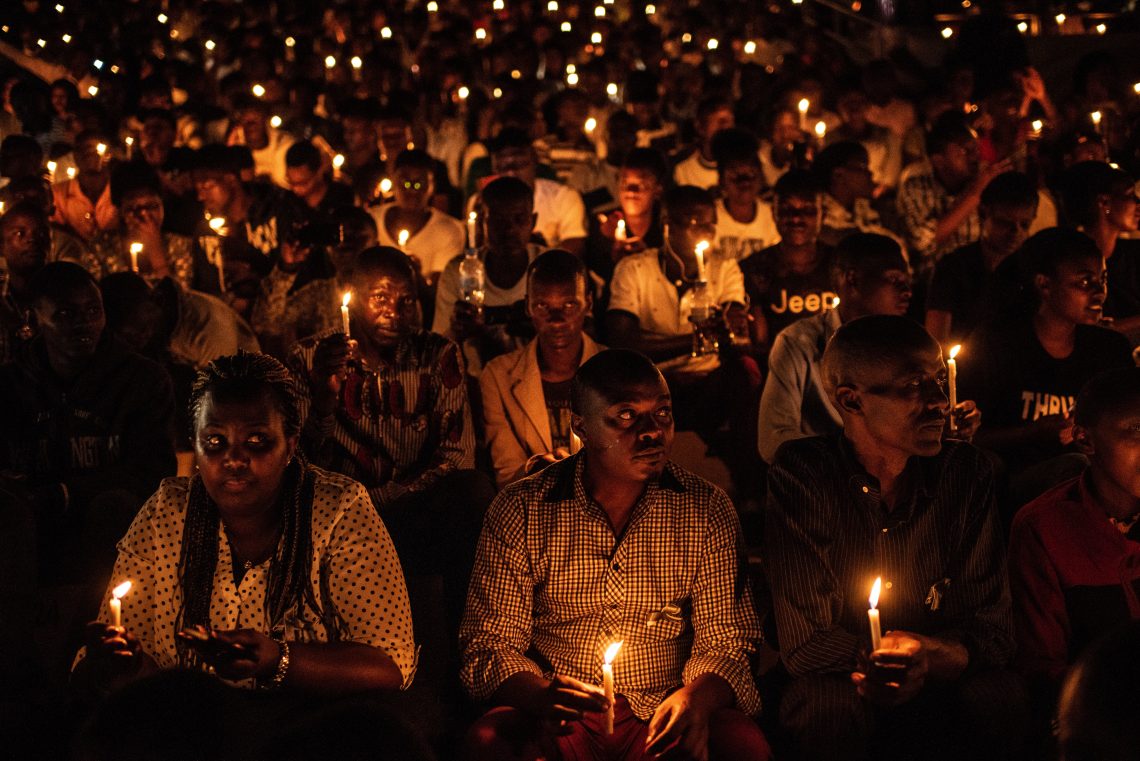
In a nutshell
- After World War II, the UN created legal tools to define and punish genocide
- 153 nations adopted the convention, agreed to “prevent, protect and punish”
- Ongoing genocides show the world has not lived up to vows of “never again”
On December 9, 1948, the United Nations General Assembly unanimously adopted the Convention on the Prevention and Punishment of the Crime of Genocide. The international treaty was the first legal instrument to codify genocide as a crime.
Commonly known as the Genocide Convention, it was created as the world was mourning 60 million deaths from World War II, including six million murdered in the Holocaust. Atomic bombs striking Japan, the obliteration of German cities and the beginning of a Cold War in 1945 led to the founding of the United Nations. Only three years later, two seminal documents came into being: the Universal Declaration of Human Rights along with the Genocide Convention.
Considering the ongoing events in the Middle East, I recall that more than 40 years ago, I went to Lebanon and urged Yasser Arafat to drop the Palestine Liberation Organization’s declared aim to destroy Israel.
In responding to the atrocities of Hamas, now is the time to recall the insistence of Anglican Bishop George Bell (1883-1958), Britain’s leading religious leader during World War II, to distinguish between the Nazis and all Germans. We must heed this advice today and draw a distinction between Hamas and all Palestinians.
And as we express legitimate fury at despicable crimes committed against Israelis by Hamas, we must reiterate Bishop Bell’s urging of proportionality and his abhorrence of war crimes, whoever commits them.
More by Lord David Alton of Liverpool
Forever wars
The global crisis of religious persecution
The challenges facing King Charles III
But we must also be clear: Any statement calling for the elimination of Jewish people is genocidal, should not be protected as free speech and brings nothing but shame and further tragedy. When some people use the political slogan “from the river to the sea,” it is not a rallying cry for Palestinian freedom from the Jordan River to the Mediterranean Sea, but rather a threat to eliminate Jews and the state of Israel.
What is happening today has a direct connection with events more than seven decades ago.
In 1945, Bishop Bell’s friend, Dietrich Bonhoeffer, was executed by the Nazis. Bonhoeffer had asked Captain Payne Best, a fellow prisoner at Flossenburg, to give Bell this message: “Tell him that for me this is the end but also the beginning.” Ten years earlier, in 1935, Bell had commissioned T.S. Eliot to write “Murder in The Cathedral.” Five years later Eliot composed the Four Quartets – the second of which, East Coker, concludes with the poet saying that humanity must renew itself, using the same thought, that “in my beginning is my end.”
The Genocide Convention was among the valiant attempts to make a new beginning.
It is worth considering three questions: What was its genesis? What does it require? Is It fit for purpose?
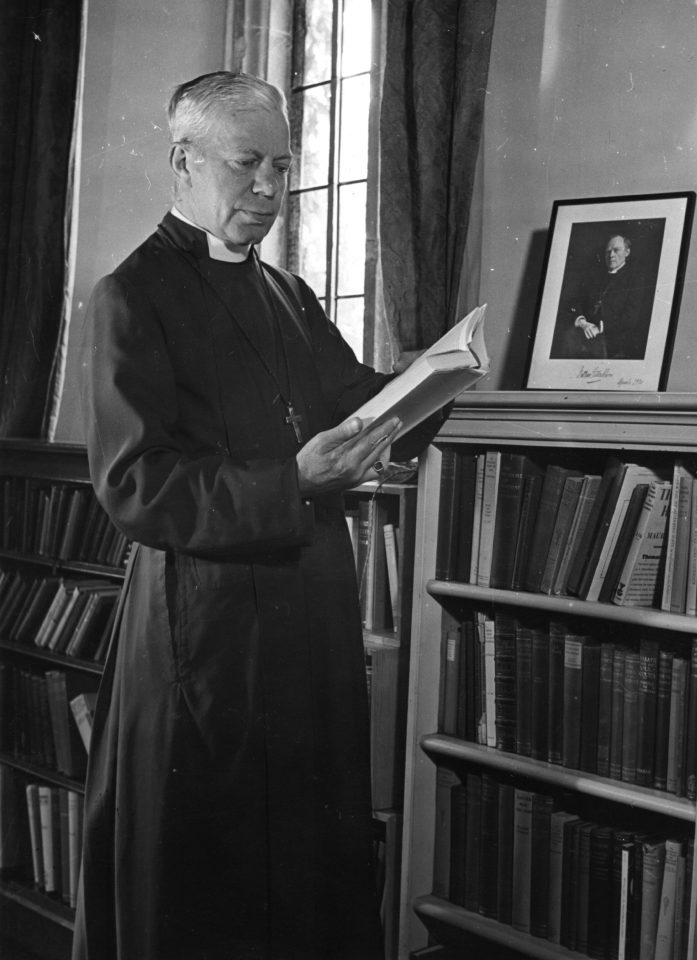
The genesis
In a radio broadcast in August 1941, Winston Churchill said there was no word to adequately describe the atrocities perpetrated by the Nazis against millions of Jews and many others including disabled people, gay people, Roma and dissenters such as Dietrich Bonhoeffer, Edith Stein, Maximilian Kolbe, Sophie Scholl and the Munich White Rose movement.
I often think about Scholl, beheaded in 1943, at the age of 21, who is noted for saying:
“One must have a tough mind and a soft heart.”
“Laws change. Conscience doesn’t.”
“Stand up for what you believe in even if you are standing alone.”
Sophie’s story was well known to Raphael Lemkin (1900-1959), a Polish Jewish lawyer, who had seen 49 of his own relatives murdered in the Holocaust.
Like Churchill, Lemkin wanted a word that graphically and succinctly described the deadly cutting of the human family: a response to the murderous infamy of Hitler’s charnel houses.
He coined a word that describes the severing of humanity, of groups of people, slaughtered because of ethnicity, religion, identity or difference. Hence, “genos” and “cide” – the Greek prefix genos, meaning race or tribe, and the Latin suffix cide, meaning killing.
Lemkin said it would be a word like “tyrannicide, homicide, infanticide” but “is intended rather to signify a coordinated plan … with the aim of annihilating the groups themselves.”
He said that his awareness of mass atrocities was first stirred as a 12-year-old when he read Henryk Sienkiewicz’s description in “Quo Vadis” of Nero throwing Christians to the lions – religious persecution often being a harbinger of far worse to come.
In 1933 Lemkin began to study and define international crimes.
He would have known of German attempts between 1904 and 1907 to exterminate the indigenous Herero and Nama peoples in Germany’s southwest African colony.
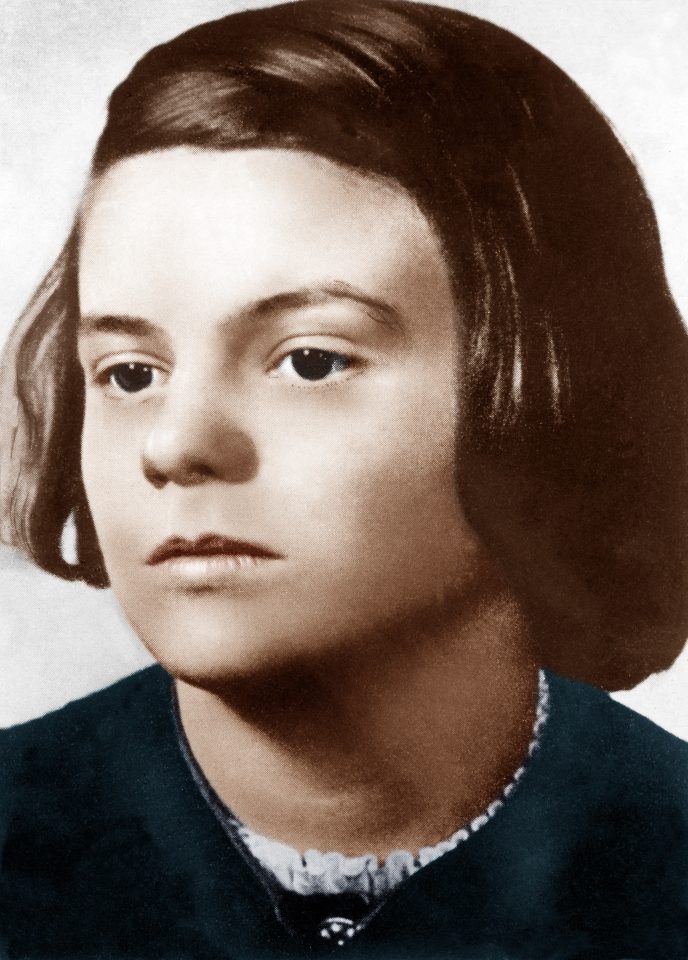
He was shocked by and studied the fate of Armenians, of whom between 660,000 and 1.3 million were slaughtered in 1915-1916, and the 1933 massacre of 3,000 Assyrian Christians at Simele in Iraq (a place I visited in 2019). You can still see evidence of fragments of bone protruding from broken walls of what was once a police station. The site is today shamefully littered with garbage and rubbish.
At the time, Britain rejected calls for an international inquiry into the killings, cravenly arguing that that such an inquiry might incite further massacres of Christians. Neither Simele nor the Armenian Genocide have ever been recognized as a genocide by the United Kingdom and the Armenians continue to suffer to this day – with 100,000 Armenians ethnically cleansed within recent weeks from their ancient homeland in Nagorno-Karabakh and the fate of the remaining 20,000 being unknown.
My own interest in the Armenians was triggered as a boy of 7, when my grandfather was dying of cancer. In 1917 he served as a soldier with British General Edmund Allenby at the taking of Jerusalem. He had kept photographs of Armenians who had been hanged by the retreating Turks, which he gave to me and which I still have.
By a curious quirk, 14 years later in 1972, while a student in Liverpool, I was elected to the City Council in an inner-city neighborhood where, in 1896, at Hengler’s Circus, the former UK Prime Minister William Ewart Gladstone, at the age of 86, had returned to the city of his birth to give his final speech.
He told a crowd of 6,000 people that he felt compelled to come out of retirement after meeting “two Armenian gentlemen” who had described “horribly accumulated outrages” – which, he said, “the powers of language hardly suffice to adequately describe.”
Twenty years later, the ignored outrages against the Armenians would become a full-blown genocide and 40 years after that would give Hitler the confidence to commit mass murder, with the observation, “Who, after all, speaks today of the annihilation of the Armenians?”
It was in this context that Lemkin wished to provide not just a word to describe the crime above all crimes but also to construct a law giving the world a new beginning.
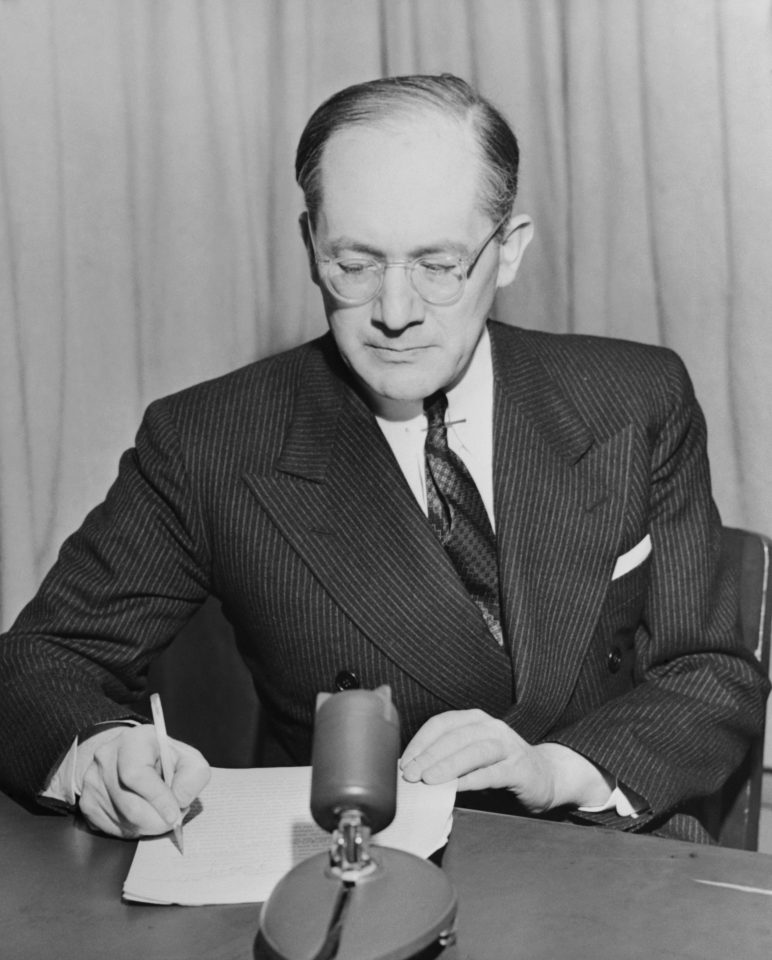
What the convention requires
In “State Responses to the Crime of Genocide,” Dr. Ewelina Ochab and I set out the fine detail of the 1948 Convention. But in broad strokes, genocide is given legal definition in Article II of the Convention.
Genocide means any of the following acts committed with intent to destroy, in whole or in part, a national, ethnical, racial or religious group, as such:
(a) Killing members of the group;
(b) Causing serious bodily or mental harm to members of the group;
(c) Deliberately inflicting on the group conditions of life calculated to bring about its physical destruction in whole or in part;
(d) Imposing measures intended to prevent births within the group;
(e) Forcibly transferring children of the group to another group
Lemkin wanted genocide to be recognized as an international crime and criminalized by domestic penal codes. He wanted to extend liability to a broad range of perpetrators and for genocide to be addressed by individual criminal responsibility and state responsibility.
During the last 100 years, manmade ideology – think of Hitler, Stalin and Mao – has been responsible for as many as 100 million deaths.
He said: “If persecution of any minority by any country is tolerated anywhere, the very moral and legal foundations of constitutional government may be shaken.”
For the UK, member of parliament Sir Hartley Shawcross, who had been chief British prosecutor at the Nuremberg War Crimes Tribunal, pressed the UN Legal Committee to declare genocide an international crime without further review. The General Assembly did so unanimously on December 11, 1946, and the Convention followed two years later, on December 9, 1948. The 153 acceding states, including the UK, agreed to duties to prevent, protect and punish. The International Court of Justice made clear that the Convention embodies principles that are part of general customary international law.
Interestingly, George Bell had spoken against the establishment of the Nuremberg Tribunal as he believed such a tribunal would not pass the test of impartial justice. He might, however, have applauded the 1998 Rome Statute, which established the International Criminal Court and to which 123 states are parties.
Although the 1948 Convention imposed a duty to prevent, it said no more than that. It would take the barbaric massacre at Srebrenica in 1995 and the Bosnian genocide for the International Court of Justice to provide such clarification in its judgment, Bosnia and Herzegovina v. Serbia and Montenegro.
It says the duty to prevent arises “at the instant that the state learns of, or should normally have learned of, the existence of a serious risk that genocide will be committed.”
To honor that duty would require states to create mechanisms to gather information and intelligence and to sound the alarm. So, do they?
Is the convention fit for purpose?
Franklin Delano Roosevelt’s hopes of a new rules-based international order – where UN blue helmets would separate warring parties and Westphalian solutions would be negotiated and adhered to – is looking obsolete and jaded, nowhere more so than in the Middle East and Ukraine.
Even measured against the remark by the UN’s most accomplished Secretary-General, Dag Hammarskjold, that the body “was not created to take mankind to heaven, but to save humanity from hell,” it looks like Satan has been getting a free ride.
During the last 100 years, manmade ideology – think of Hitler, Stalin and Mao – has been responsible for as many as 100 million deaths. Add to that the brutality generated by totalitarianism, jihadism and nationalism, and the number of people who have seen their lives ended by violence is unfathomable. It has generated the mass movement of fleeing people with an unprecedented number of displaced: 110 million worldwide.
“Never again” has happened again and again.
Measured against the 1948 hopes of a new beginning, only a fool would suggest that the Convention has achieved Lemkin’s ambitions. What was meant to occur “never again” has happened again and again.
In 1979, as a new MP, I raised the issue of the killing fields of Cambodia – where Pol Pot and the Khmer Rouge killed 1.7 million of the country’s 7 million people.
In the Commons, I criticized the government’s silence during a visit to the UK by Pol Pot’s ally, Hua Guofeng, China’s Communist chairman. Even then, economics and politics determined what we say about genocide.
Think, too, of Iraq, where 50,000 Kurds were killed during the ethnic cleansing of Anfal in 1987; of Bosnia, where 100,000 Muslims were killed between 1992-1995; of Rwanda, where more than 800,000 Tutsis and Hutus were slaughtered over 100 days in 1994.
In a report I wrote in 1994, I described how the Interahamwe militiamen (Interahamwe means “those who work together”) and soldiers arrived and surrounded the school in Murambi where Tutsis had taken shelter, believing French peacekeepers would protect them.
Armed with guns and grenades, the Interahamwe began killing. They killed for over 6 hours. By the morning thousands of civilians were dead.
In my report I described how “56,000 bodies were found there, and we walked from classroom to classroom, viewing 852 remains that have been disinterred. Within a few days of the massacre, a volleyball court had been built on top of one of the mass graves which, we were told, the French peacekeepers then used in their leisure time.”
Murambi is now a memorial and in the classrooms lie thousands of white skeletons, sometimes frozen in the positions they fell. It is as if a man-made Pompeii had swept over the hill and through the buildings. Some still clutch their rosaries. Some of the women were clearly pregnant. Skulls bear the marks of the machetes used to hack them down.
It takes a lot of planning to kill thousands of people. Orders must be given for roadblocks to be set up. Petrol must be requisitioned for the vehicles that transport the killers up the hill. Grenades and ammunition must be distributed to the soldiers. Avid killers need to be praised; slackers exhorted to work harder, to kill faster. Genocide is a vast criminal enterprise.
Former U.S. President Bill Clinton admitted that if the U.S. had acted on the warnings, a third of the lives lost – roughly 300,000 – could have been saved. British officials were also aware of the warning signs but failed to act.
After Rwanda I traveled to Darfur and collected evidence of what has become known as the first genocide of the 21st century: 300,000 were killed and 2 million displaced. Basking in impunity, the same jihadists began all over again in August of this year; while Omar al-Bashir, Sudan’s former president, remains indicted for the Darfur Genocide by the International Criminal Court (ICC), though he has not yet been brought to justice.
Today, from Sudan to Karabakh to Northern Nigeria to Myanmar, it is very clear that the noble ideals that led to the framing of Lemkin’s Genocide Convention are largely being honored in their breach.
There are four real-time genocides happening today on our watch – in Iraq, Tigray, Xinjiang and Ukraine. I cite them to suggest how the Convention might be made fit for purpose and to ensure that genocide does not have to have the last word.
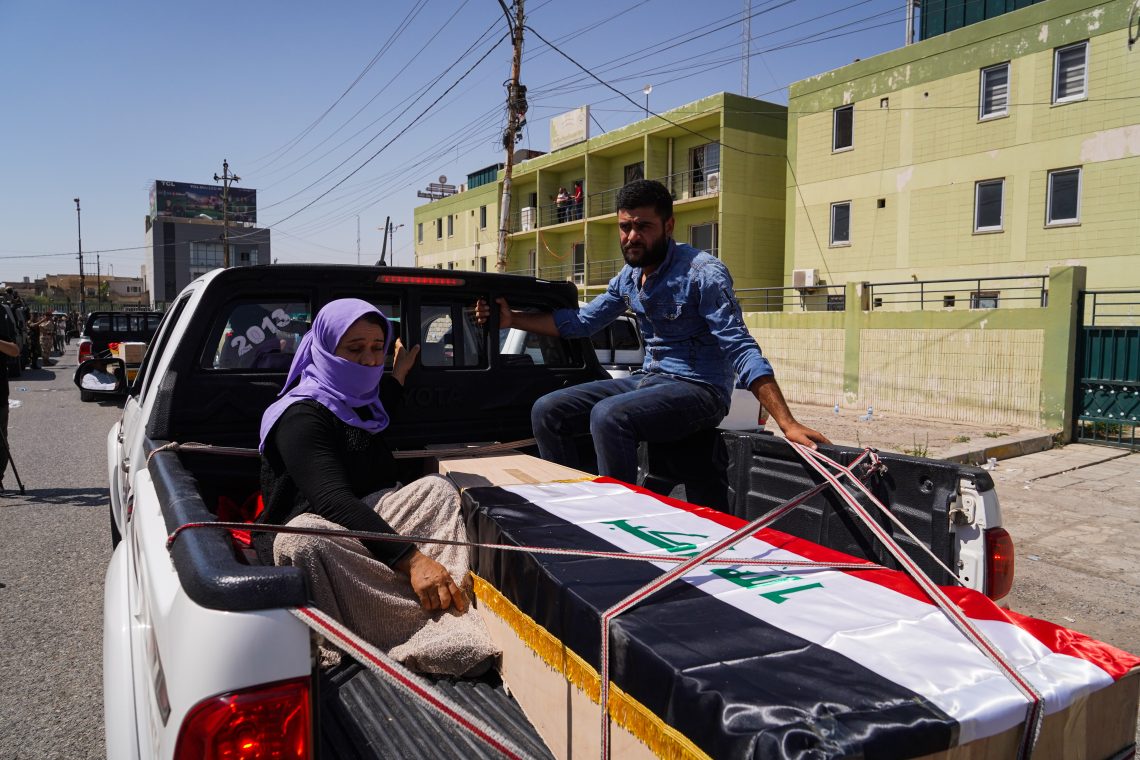
Iraq: The Yazidis
In 2014, Islamic State (also known as ISIS or Daesh) unleashed a genocide against religious minorities in Syria and Iraq.
The seeds of genocide are invariably planted in a climate of indifference and impunity, with discrimination morphing into persecution and then into crimes against humanity and finally genocide. One Assyrian told me that the “persecution has become institutionalized. We feel abandoned by the international community. We feel unsafe, politically disempowered and excluded.”
ISIS gave Christians an ultimatum to convert to Islam, pay a religious tax, flee or be killed. In Mosul, to know whom to target, they marked Christian homes with the letter N for Nazarene and the homes of Shia Muslims were similarly daubed, with R for Reject.
The Syrian Orthodox Bishop of Mosul, Bishop Nicodemus, told me “ISIS destroyed our homes, our churches, our monasteries, our dignity. They destroyed everything.”
In 2019 in Northern Iraq, I met two men whose families fled from Mosul and another whose home was burnt down in Sinjar.
No one from the international community or the governments in Baghdad or Erbil had ever asked to meet them or to take their statements. Yet we have been told ad nauseam that we are “collecting evidence” and that perpetrators will “be brought to justice.”
The late Baba Sheikh, the Yazidi spiritual leader, told me how on August 3, 2014, Daesh launched a violent attack against Yazidis in Sinjar.
Daesh fighters killed hundreds, if not thousands of men. The victims’ mass graves continue to be discovered to this day. As then British Foreign Secretary Boris Johnson said, Daesh “are engaged in what can only be called genocide of the poor Yazidis.” Yet it has taken until 2023 for the UK to recognize it as a genocide – and only now because a German Court secured a conviction for the crime of genocide.
Many other crimes go untried, including those of fighters who abducted boys to turn them into child soldiers, and women and girls for sex slavery. More than 3,000 women and girls are still missing, and their fate is unknown. I recently met British officials and asked why returning ISIS terrorists had not been investigated or charged over their role in those events.
Daesh fighters committed murder, extermination, enslavement, deportation and forcible transfer of the population, imprisonment, torture, abductions of women and children, exploitation, abuse, rape, sexual violence, forced marriage, enforced disappearance and much more – atrocities clearly matching the criteria listed as genocidal methods in Article II of the Genocide Convention.
Daesh also declared homosexuality to be punishable by execution. There are shocking reports of gay men being tortured and killed. In Kirkuk, ISIS executed a young Iraqi man by throwing him from the top of a building on charges of being gay. His corpse was later stoned by the crowd. Four others were executed in Nineveh.
Murder motivated by a hatred of another’s orientation, along with rape and sexual and gender-based violence, should all be considered as part of the crime of genocide.
Another gap is that political classes are also not covered by the Convention. Ten years ago a UN Commission of Inquiry found evidence of “crimes against humanity” in North Korea. But it could not call the targeting of political dissenters (in what the Inquiry said is “a state without parallel”) a genocide – although it did leave open the question of the targeting of religious believers, who are systematically taken to prison camps where they are tortured and killed.
These gaps in the Convention need to be filled, but the case of the Yazidis suggests something even more fundamental.
In the case of atrocity crimes, we must challenge the use of the veto in the Security Council to prevent referrals to the ICC and we must use ad hoc tribunals where perpetrators attempt to frustrate accountability and justice. And we must be far more vocal in opposing the cynical creation of mechanisms for collecting evidence only to be hamstrung before they finish their job, like the Investigative Team to Promote Accountability for Crimes Committed by Daesh/ISIS (UNITAD) whose mandate expires in 2024.
The talk now in Iraq is of an amnesty rather than justice. What will happen to the evidence and data already collected? What will happen to victims and survivors who put their trust in the mechanism and now do not see any hope for the justice and accountability for which they long?
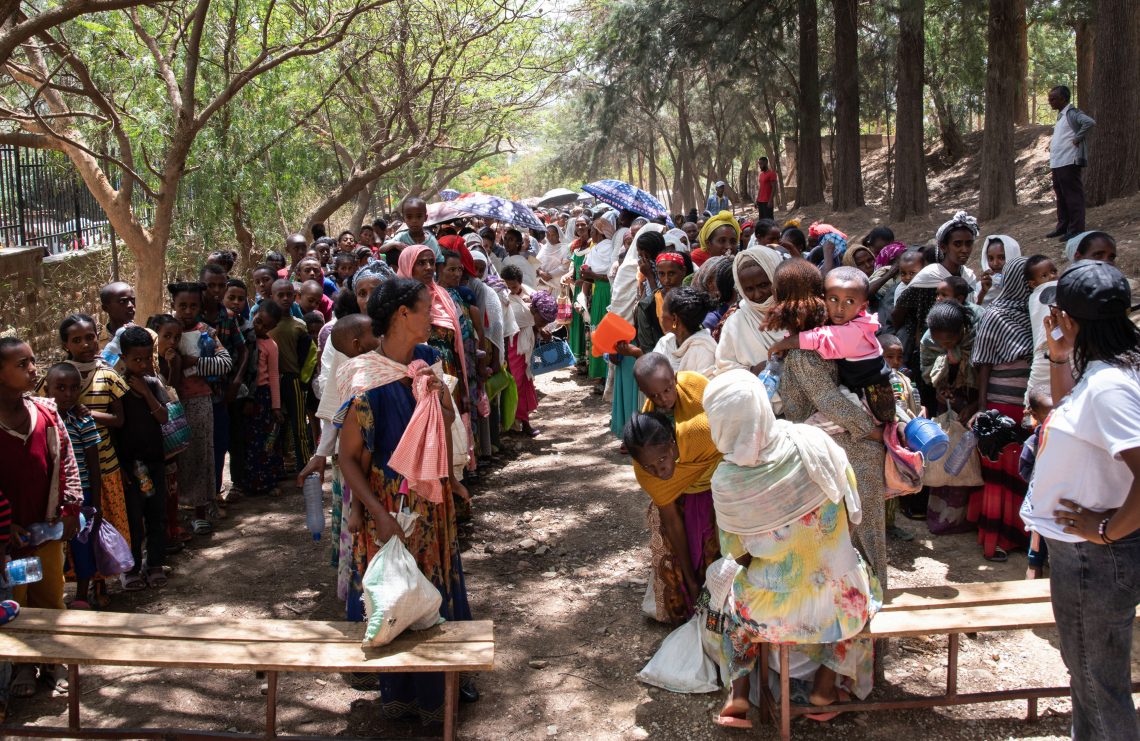
The hundreds of thousands of victims in Ethiopia
The headline figures from the war in the Tigray region of Ethiopia are that 500,000-800,000 people have been killed; over 120,000 people have been subjected to conflict-related sexual violence; over a million people are internally displaced within the region; over 60,000 Tigrayans have fled to Sudan; about 2.3 million children remain out of school and thousands of people have starved to death.
This amounts to a terrible stain on our collective conscience. We failed to act as Ethiopian and Eritrean militias set up blockades, burnt food silos and went from village to village committing genocidal massacres and rapes. And the atrocities continue. The evidence is set out in a report sent to all Permanent Missions to the UN in Geneva with a call to renew the 2021 mandate of the International Commission of Experts in Ethiopia (ICHREE).
As with Iraq, the premature ending of mandates and of the collection of evidence raises genuine doubts about how serious we are about punishing the perpetrators and bringing them to justice.
In Tigray, we failed to predict, to prevent, to protect and now we fail to punish – with such impunity opening the way for future atrocities.
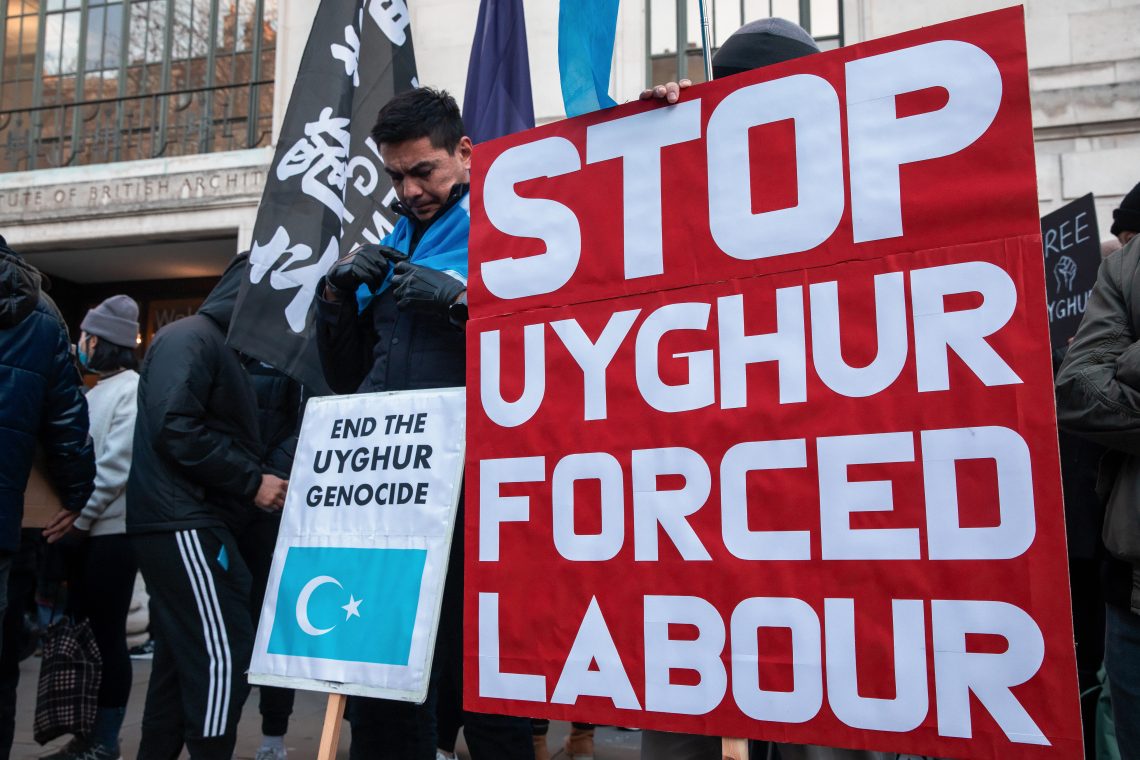
The plight of Xinjiang’s Uighurs
What word comes to your mind when you hear evidence of a state involved in the destruction of a people’s identity; involved in mass surveillance; involved in forced labor and enforced slavery; involved in the uprooting of people, the destruction of communities and families, the prevention of births, the ruination of cemeteries where generations of loved ones had been buried?
What word comes to mind when you hear of people being forcibly indoctrinated to believe that they, their people, their religion and their culture never existed – and the certainty that through ethno-religious cleansing, they will cease to exist?
Those whose signature is written across these monstrous crimes know that name well, but smugly sleep content, believing that corrupted and compliant self-serving institutions and commercial considerations will keep them safe in their beds.
Genocide should be bad for business, but it has not been in the past and it is not now.
Through amendments to the Trade Act and other legislation, I have sought to demonstrate how business as usual has been the priority even when the House of Commons, the U.S. administration, numerous parliaments and the Independent Tribunal chaired by Sir Geoffrey Nice KC have declared a genocide in Xinjiang.
Genocide should be bad for business, but it has not been in the past and it is not now.
Think of Nazi slave labor and beneficiaries such as IBM and Volkswagen, which even built a labor camp next to one of its factories to ensure a steady supply of workers. What is happening to the Uighurs is comparable. In October, Dr. Adrian Zenz produced a new paper on the labor camps.
Uighurs have been forced to work in factories that form part of the supply chains of at least 83 global brands including: Amazon, Huawei, Nokia, Samsung, Siemens, Sony and Volkswagen.
We should not accept the counterargument that trade brings liberal democracy. It has not in China, Saudi Arabia or Iran.
This is not a new debate. Some 200 years ago, Richard Cobden, the foremost champion of free trade, said free trade was not more important than our duty to oppose both the trade in human beings and the trade in opium.
My all-party amendments to determine whether atrocities amount to genocide – which would have created a British judicial mechanism, independent of government and the vested interests that influence it – was passed in the Lords but narrowly defeated in the Commons.
Such an essential change, supported by at least two former prime ministers, is one which will be returned to parliament.
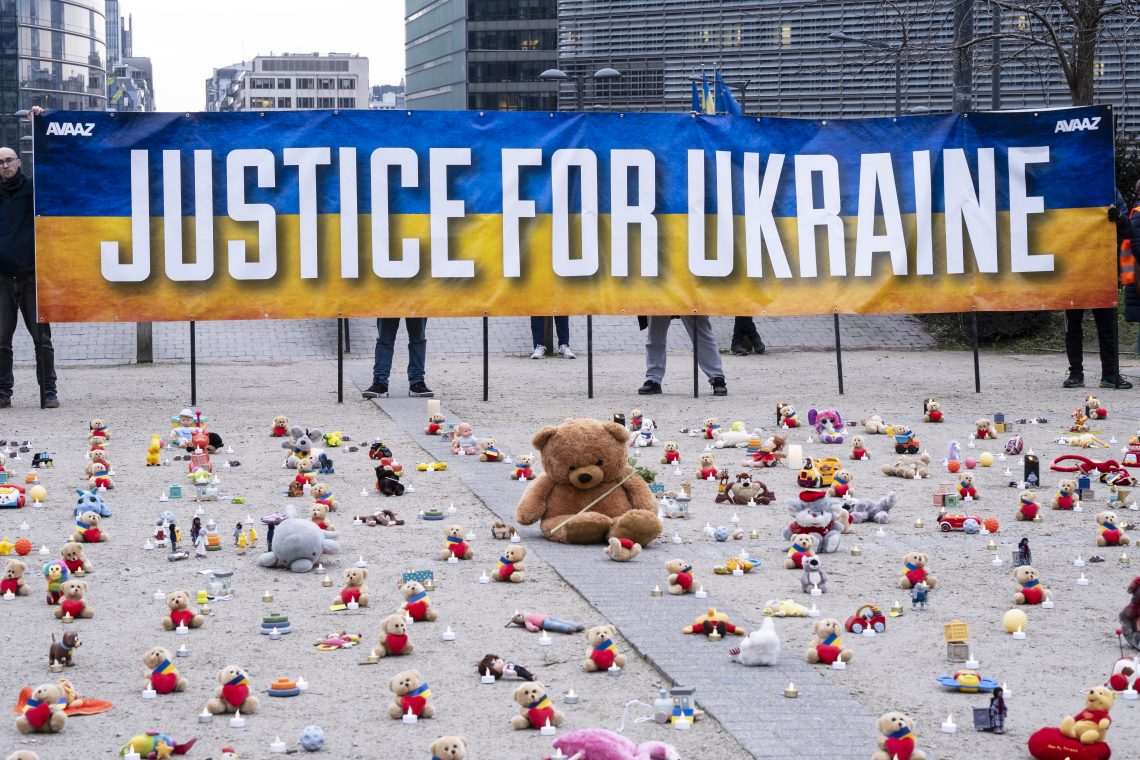
Russia’s victimization of Ukrainian children
One of Lemkin’s indicators of genocide listed in the Convention is the forcible transfer of children. It has happened to Uighur children, and it is also happening to an estimated 20,000 Ukrainian children. Russian citizenship is imposed; they are forbidden to speak and learn the Ukrainian language or to preserve their Ukrainian identity.
They are also illegally adopted by Russian families – with new laws that were specifically designed to speed up the process without any due attention to the best interests of the child.
“Why is the killing of a million a lesser crime than the killing of an individual?”
Earlier this year at the UN General Assembly, Ukrainian President Volodymyr Zelenskiy referred to the plight of the kidnapped Ukrainian children:
“What will happen to them? … Those children in Russia are taught to hate Ukraine, and all ties with their families are broken. … This is clearly a genocide. When hatred is weaponized against one nation, it never stops there.”
On March 17, a pretrial chamber of the International Criminal Court issued warrants of arrest for war crimes, for Vladimir Putin and Maria Lvova-Belova, who has orchestrated the abductions.
One practical thing the UK could do would be to amend its law, especially the International Criminal Court Act 2001, to ensure that those responsible for international crimes and who are not UK citizens or residents can be prosecuted by British courts.
Conclusion
Opposite the Palace of Nations in Geneva stands the broken chair, erected in 1997. Daniel Berset intended the missing leg to symbolize the breaking of so many lives by land mines. But, for me, it is also a symbol of the breaking of humanity every time a genocide occurs. Think of the Yazidis, Tigrayans, Uighurs, Ukrainians, Armenians – and all the others to whom I have referred. Those examples provide little cheer but on this 75th anniversary they should be a spur to complete the work of Raphael Lemkin who asked in 1939: “Why is the killing of a million a lesser crime than the killing of an individual?”
In asserting the importance of confronting the crime above all crimes and the place of international law let me give the final word to Bishop Bell who, in 1944, speaking in the House of Lords, said, “The Allies stand for something greater than power. The chief name inscribed on our banner is ‘Law.’”
Humanity would certainly be in a better place if 75 years later we finally made reality of Lemkin’s law on genocide.
For industry-specific scenarios and bespoke geopolitical intelligence, contact us and we will provide you with more information about our advisory services.








